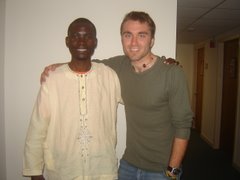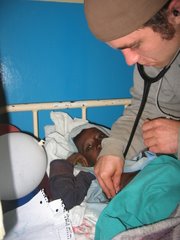Below is a short article from the US written to college-aged kids about the music project:
You might not have read about it in the American Journal of Medicine, but they’re working on a new HIV/AIDS prevention in
The guy mixing this vaccine isn’t a chemist, he’s a producer. That is about as far as my cute little analogy can go, but this is something we all should be paying attention to. Right now, halfway across the world from where I am writing, the Kigali Boyz and Miss JoJo are recording a song with a purpose.
These days The Kigali Boyz (KGB as they’re called) and Miss JoJo are two of the biggest Rwandese music acts around. Spend any amount of time with youth in
Knowing that, Miss JoJo and KGB, along with the help of few other friends, decided that they’d put something new in Rwanda’s head, a little message about what is happening in their country and the serious public health effects this HIV/AIDS epidemic brings. A message that we all hope will cause people to look at how they are living in a world that is being devastated by AIDS, which also begs the question, “so what choices are you going to make in this new world?” This isn’t a plea for money from the West, or a guilt trip for a rich white business man (although I know
Fortunately, getting people to listen to this message should not be difficult for this group of artists. Miss JoJo’s voice is, at the same time, beautiful and accessible, while KGB’s flows carry rhythms that at times even seem to double the background beat. If you never took that music class you planned on taking at your local community college, basically what I’m saying is they’re talented and their music is catchy.
When I say that these artists are stars on
That’s what makes this song that KGB and Miss JoJo are putting together all the more impressive. These artists are not removed from the daily hardships of HIV/AIDS because of their fame. If Paris Hilton were to sing about growing up in the projects and about her violent lifestyle we’d all laugh, but when Jay-Z does it we turn it up. That’s exactly what these artists are doing. They’re not coming down from their mansions on the hill for a little public service project; they are a part of the community that is struggling to survive in the face of HIV/AIDS. They are authentic and they are good. What else is there to say?

































